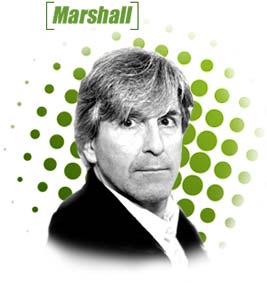 Phil commented on that last piece. I forget that people actually read these things. I assumed you were all lazy and illiterate ;)
Phil commented on that last piece. I forget that people actually read these things. I assumed you were all lazy and illiterate ;)Yes . . . as Phil says . . . we have taken time to write this screenplay. And it's depressing to think about it.
Sometimes I feel like Marshall in Absolutely Fabulous. Marshall went to Hollywood 20 years ago to develop a screenplay with a studio. People in various episodes ask him how it's going. He usually has an actor attached, or a big producer, or an out-of-work director . . . No doubt Jennifer Saunders has met a few of these people. The industry is teaming with writers working on a screenplay. Until a screenplay becomes a film - it's only a blueprint - not considered an art form in itself. And yet it takes such a long time to write one.
When people ask me what I do - I answer web designer. It's my knee-jerk, "pat" response. It's also less problematic and gets me more $work than if I say, "filmmaker". But saying "web designer" feels like somehow I've lied - like I'm undercover - posing as a normal person.
A boxer called me up the other day (not the dog kind) and told me he had a really good idea for a screenplay. I called his bluff and asked to see the paper version. Really good ideas are two-a-penny.
Anything not on paper is royalty-free.
Legally, if you told a screenwriter (like myself) your really good idea and he wrote it - verbatum . . . it would then become his really good idea. He has legal proof of the idea and you don't. While writing is poorly renumerated, it is considered evidence in a court of law. It's why Production Companies ask you to sign a waiver before you submit your work. They also have really good ideas, but at least their ideas are in development (which means on paper).
 "Have you written anything, yet?" I asked him, doubtfully. He stumped me by having a bit of a draft to show me (very unusual) . . . and it wasn't as bad as it could have been!
"Have you written anything, yet?" I asked him, doubtfully. He stumped me by having a bit of a draft to show me (very unusual) . . . and it wasn't as bad as it could have been!I had a spare couple of hours, So I did some notes on his screenplay. He was so chuffed, he offered me a couple of boxing lessons . . . I settled for a service testimonial.
So here we both are, working on a screenplay we started in 1994. Call us Marshall.
On the bright side - the story has held our interest for all those years and it has led to many other screenplay ideas. The learning curve alone has catapulted our abilities as writers.
Now that some time has passed between our Arista experience, A Stone Throw and working with Sydney-based script-editor, Duncan Thompson . . . the holes in our script are painfully clear. There are so many really good ideas flying wildly about on those 100 pages that we often lose sight of our main character . . .
Katy.
I think that if we can rope the story in - and really make it hers - we will, as some have already pointed out, have a masterpiece before us. In the meantime, I have 100 uni assignments to mark before Phil arrives (for writing session 2013466) . . .
If you'll be so kind as to excuse me . . . a pan of 2 minute noodles beckons.
Comments
-Nel